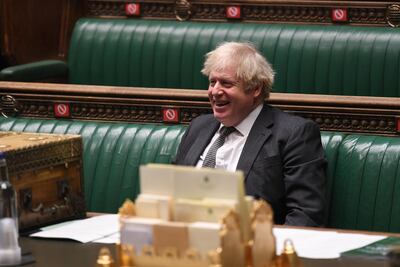On the historic day when Britain's Brexit quest finally became reality, perhaps the most surprising aspect of the comments made by political leaders on both sides of the English Channel was their mutual commitment to European unity.
One of the great canards perpetrated by die-hard Remain supporters – those who wanted Britain to retain its membership of the EU at all costs – was that, by voting for Brexit, the British people were somehow turning their backs on Europe.
In fact, as British Prime Minister Boris Johnson was keen to emphasise when he first announced the breakthrough in the Brexit negotiations on Christmas Eve, the country was not turning its back on its neighbours. He insisted that Britain was entering into a new trading arrangement with the EU, one where the democratically elected UK Parliament, and not a collection of unelected European technocrats, had ultimate authority over British law-making. In his inimitable style, Mr Johnson emphasised that Britain would remain “culturally, emotionally, historically, strategically and geologically attached to Europe".
It was a point he was keen to reiterate when he opened this week's debate in the House of Commons on the Brexit bill, which was passed with 521 votes to 73 after a majority of opposition Labour MPs joined their Conservative colleagues in voting for the legislation.
After more than four-and-a-half years of bitter recriminations between Leave and Remain supporters since the Brexit referendum in June 2016, Mr Johnson sought to put the debate in its proper context. "Those of us who campaigned for Britain to leave the EU never sought a rupture with our closest neighbours," he said. "Now, with this bill, we shall be a friendly neighbour – the best friend and ally the EU could have – working hand-in-glove whenever our values and interests coincide while fulfilling the sovereign wish of the British people to live under their own laws, made by their own elected Parliament."
In Brussels, where the EU negotiating team led by Michel Barnier struggled to fully comprehend Britain’s insistence on sticking to the sovereignty issue – even if it meant leaving the trade bloc without a deal – European leaders were quick to praise the start of the new relationship. European Commission President Ursula von der Leyen tweeted: “It has been a long road. It’s time now to put Brexit behind us. Our future is made in Europe.” Mr Barnier, meanwhile, praised both European and British negotiating teams, tweeting: “Each person played their part in building European unity. Thank you!”
The sheer breadth of the agreement, which runs to 1,246 pages and covers everything from car manufacturing to fisheries policy and is worth a staggering £668 billion ($912.6bn), is undoubtedly a phenomenal achievement. And it has already attracted envious comments from other European countries that enjoy separate trading ties with the EU.

Marit Arnstad, parliamentary leader of Norway’s Centre Party, which is currently leading the country’s polls, said the Brexit trade deal was "a better agreement" than the one that governs Norway's relations with the EU, saying the UK has won "more freedom and more independence".
Significant obstacles remain, of course, not least the City of London’s trading relationship with the EU, which has still to be resolved. As matters stand, Britain’s financial services industry, which accounts for about 7 per cent of the country’s GDP, will have less access to Europe’s single market from January 1, with both Frankfurt and Paris keen to enhance their status as financial centres. Even so, London’s position as the world’s biggest centre for foreign-exchange trading is unlikely to be affected, and EU member states could find that trying to exclude London’s expertise from European markets is counter-productive.
Certainly, with the value of sterling rising against the dollar and euro immediately after the Brexit deal was announced, Britain's financial institutions are expanding, instead of shedding jobs, as many Remainers had predicted. A recent survey for the Financial Times showed that more than half of the largest finance firms in London have already increased their employee headcount in the past five years.
Of more concern is the impact Brexit might have on the future of the UK itself, with Scottish and Welsh nationalists reiterating their demands for full independence and the right to rejoin the EU, even though it remains a moot point whether Brussels would be willing to admit an independent Scotland or Wales to its ranks.
The real challenge for post-Brexit Britain, though, will be to re-establish its status as a major world power. While Britain's standing has diminished in recent years as a result of the preoccupation with Brexit, Britain nevertheless remains the biggest military power in western Europe, making it a key player in the Nato alliance. It has the world's fifth largest economy and is a permanent member of the UN Security Council. And with Brexit out of the way, London will be in a stronger position to help revive the trans-Atlantic alliance with the US after the tensions that characterised the Trump era, and will be well-placed to help President-elect Joe Biden to achieve his aim of breathing new life in the western alliance.
As Mr Johnson declared during the Commons debate, the Brexit deal will "open a new chapter in our national story". It is now up to him to make sure it is one that makes for enjoyable reading for future generations.
Con Coughlin is a defence and foreign affairs columnist for The National

